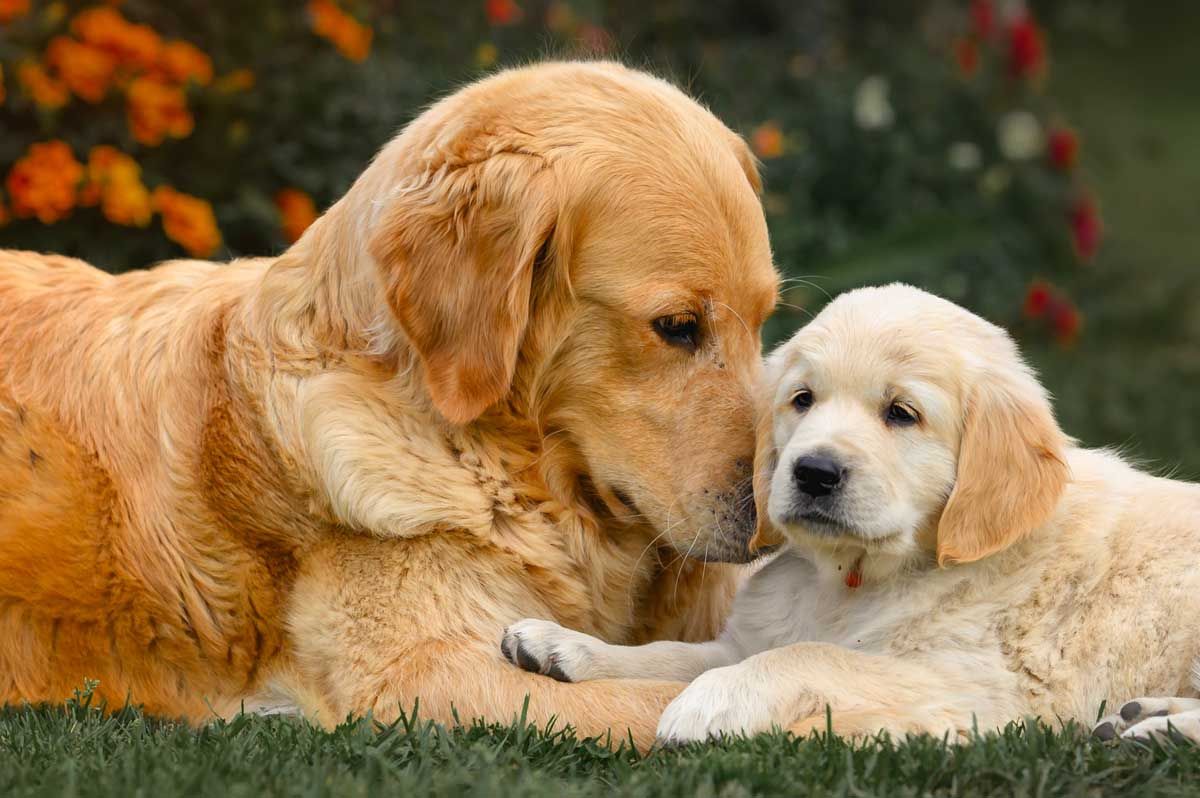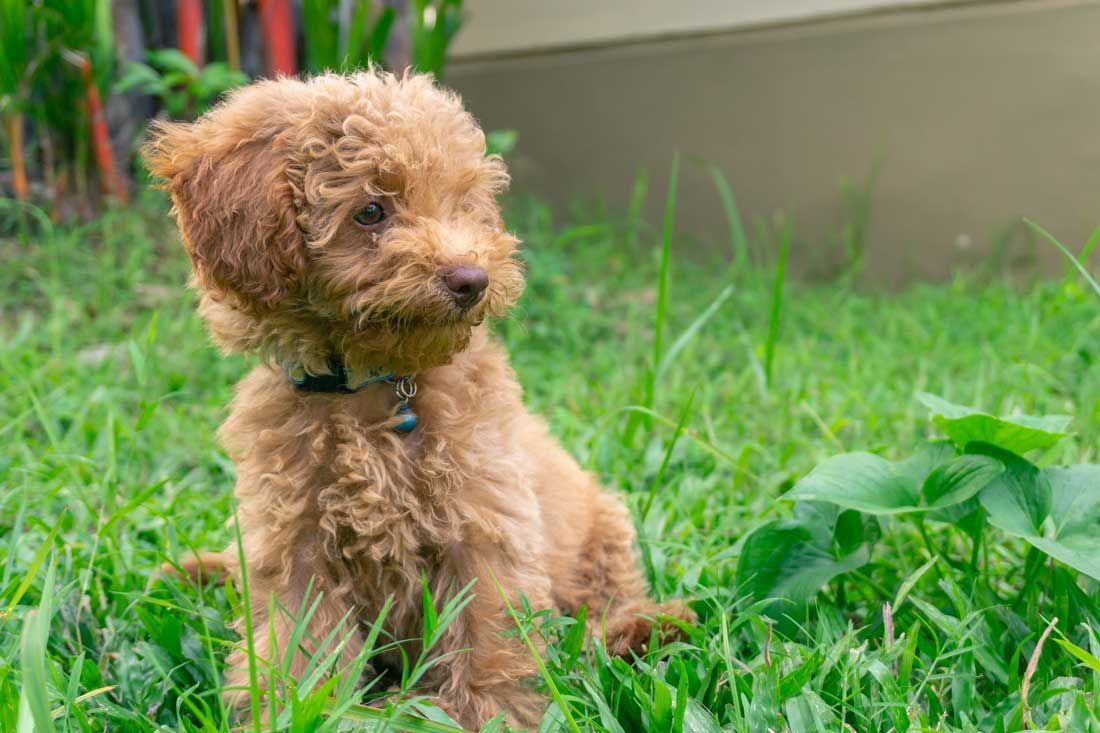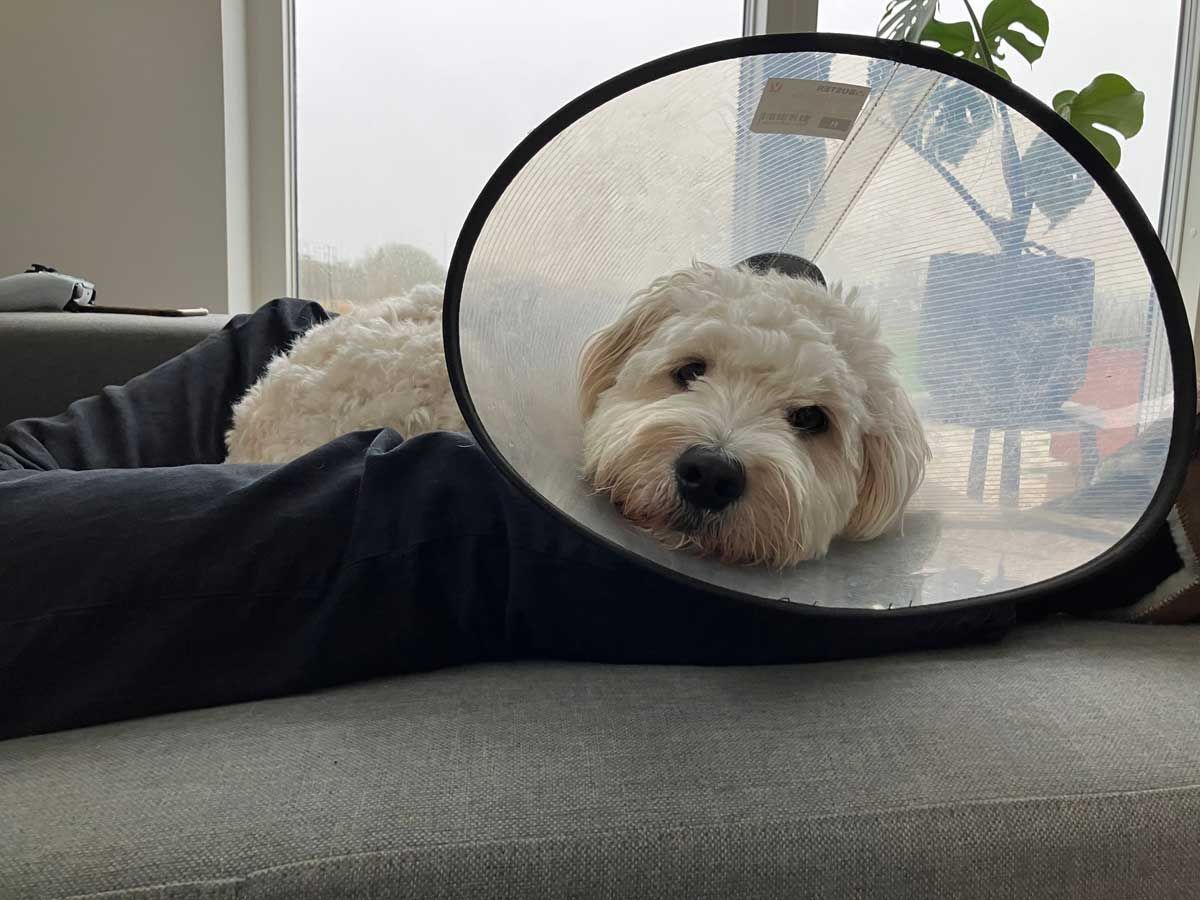VETERINARY SERVICES
Vaccinations for Cats
Cat vaccinations have revolutionised the control of infectious diseases in young and old felines. With annual cat vaccines from the friendly team at Sydney Animal Hospitals, you can protect your furry feline from serious viruses and common conditions.
Prevention is the best medicine
Cat Vaccinations
Vaccination has revolutionised control of infectious diseases in our pets. It is essential that all pets are adequately vaccinated to help protect the pet population as a whole. Responsible pet care requires kittens to be given their initial course of vaccinations, but this cannot protect them for the rest of their lives. Adult cats require regular vaccination to maintain immunity against disease.
The Importance of Cat Vaccines
The cat vaccination has revolutionised the control of infectious diseases in our pets. All pets must be adequately vaccinated to help protect the pet population as a whole.
Responsible pet care requires kittens to be given their initial course of shots, but this can’t protect them for the rest of their lives. Older felines require regular cat yearly vaccinations to maintain immunity against disease.
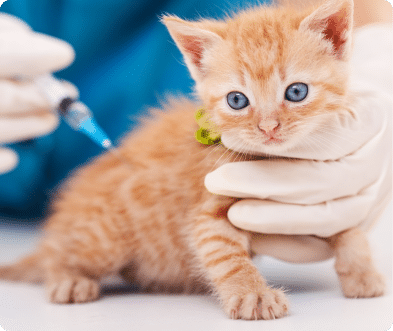
Kitten Vaccinations
Kittens are temporarily protected against many diseases by antibodies from their mother’s milk. These maternal antibodies decline in the first couple of months of their lives. However, until they drop sufficiently, they can also neutralise vaccines. This is why a series of shots is necessary for kittens.
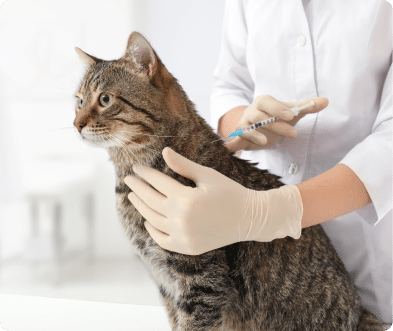
Adult Cat Vaccinations
The immunity from kitten vaccinations weakens over time, and your pet can again become susceptible to disease. Annual health checks and cat shots will protect your pet the best.
Cat Vaccinations in Sydney Aftercare
Following vaccination, your cat may be off-colour for a day or two, or have slight swelling or tenderness at the injection site. Access to food and water, and a comfortable rest area, are usually all required for a quick recovery. However, if the response seems more severe, you should contact us for advice.
Please give us a call to discuss a suitable vaccination regime for your pet kitten or cat. We’re a respected cat vet in Sydney and have several clinics to visit. Our team always strives to make your furry friend feel at home!
We’re here for your pet – before, during, and after their visit.
Infectious Diseases Annual Cat Vaccinations Prevent
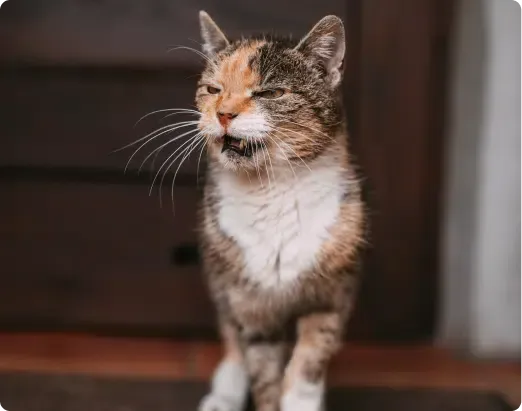
Feline Enteritisis (Feline Panleukopenia)
This disease is very contagious and the death rate is high, especially under 12 months of age. Pregnant cats may lose their young or give birth to kittens with abnormalities, quite often with brain damage. Symptoms are depression, loss of appetite, uncontrollable vomiting and diarrhoea, often with blood and severe abdominal pain.
The virus spreads so easily that heavily contaminated areas require cleaning with a special disinfectant. Cats that do recover may continue to carry the virus for some time and infect other animals.
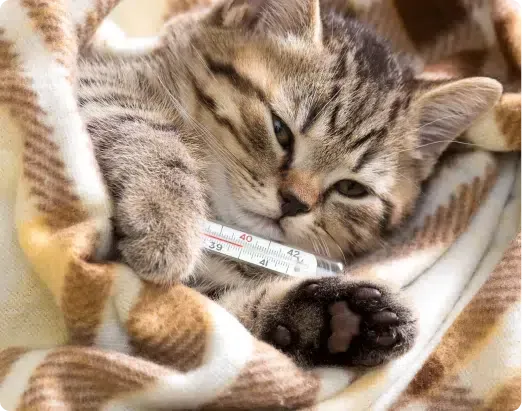
Feline Respiratory Disease (cat flu)
This is caused in 90% of cases by feline herpesvirus (feline rhinotracheitis) and/or feline calicivirus.
Feline respiratory disease affects felines of all ages, but especially young kittens, Siamese and Burmese breeds. It is highly contagious and causes sneezing, coughing, runny eyes, nasal discharge, loss of appetite and tongue ulcers.
Fortunately, the death rate is low except in young kittens, but the disease is distressing and may persist for several weeks. Recovered felines can continue to carry and spread the infection for long periods, and can show signs of the disease again if they become stressed.
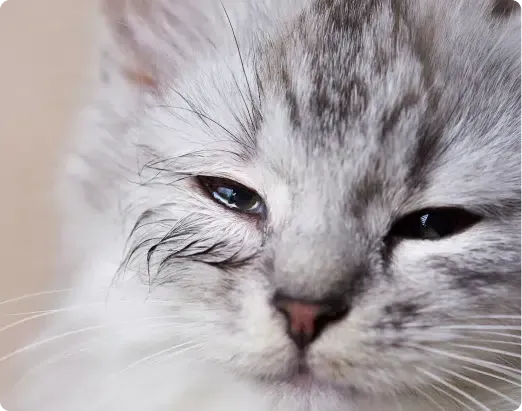
Chlamydia (also known as chlamydophila)
Feline chlamydia causes a severe, persistent conjunctivitis in up to 30% of felines. Kittens are more severely affected by chlamydia when also infected with ‘cat flu’, and chlamydia can be shed for many months. Vaccination against flu and chlamydia helps protect against clinical disease.
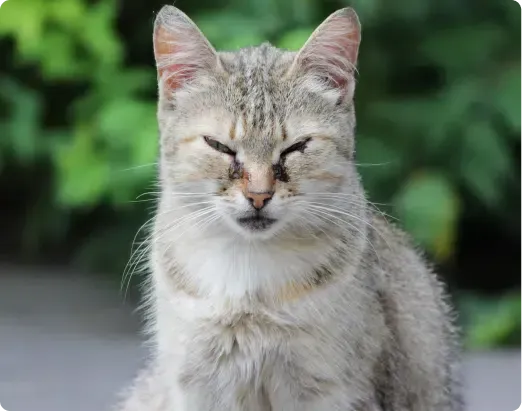
Feline Leukaemia (FeLV)
Feline leukaemia is a serious disease of cats caused by feline leukaemia virus (FeLV). The virus attacks the immune system and may be associated with lack of appetite, weight loss, pale or yellow mucous membranes, vomiting, diarrhoea, reproductive problems, increased susceptibility to other infections, leukaemia and tumours. Many felines may be infected and show no signs at all.
About one-third of infected cats remain chronically infected and may shed virus in their saliva, tears, nasal secretions and urine. The disease is then spread to uninfected animals by mutual grooming, fighting, sneezing or even flea bites.
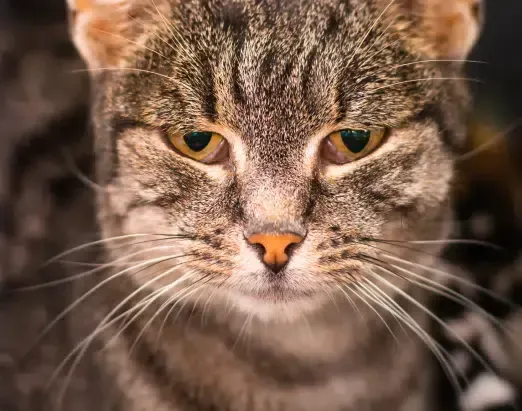
Feline Immunodeficiency Virus (FIV)
Feline AIDS is a disease caused by infection with feline immunodeficiency virus (FIV) and affects the cat’s immune system. Their natural defence against attack by other diseases may be seriously affected, much in the same way as human AIDS.
This disease is not transmissible to humans.
FIV is almost always transmitted by bites from infected cats. The virus that causes the disease is present in saliva. While some infected cats show no sign of disease, others may display initial symptoms such as fever, loss of appetite, diarrhoea, lethargy and swollen lymph nodes.
As the disease progresses, symptoms may occur such as weight loss, sores in and around the mouth, eye lesions, poor coat and chronic infections. Eventually, the immune system becomes too weak to fight off other infections and diseases. As a result, the cat may die from one of these subsequent infections.
If you have any questions, please contact your local Sydney Animal Hospital.
7 Sydney Animal Hospital Locations Across Sydney
Sydney Animal Hospitals have 7 locations across Sydney for your convenience
Newtown
Open 7 days
Inner West
Open 7 days
69-73 Erskineville Rd, Erskineville NSW 2043
(02) 9519 4111
Norwest
Open 7 days
69-73 Erskineville Rd, Erskineville NSW 2043
(02) 9519 4111
Kellyville
Open 7 days
69-73 Erskineville Rd, Erskineville NSW 2043
(02) 9519 4111
Baulkham Hills
Open 7 days
69-73 Erskineville Rd, Erskineville NSW 2043
(02) 9519 4111
Newport
Open 7 days
69-73 Erskineville Rd, Erskineville NSW 2043
(02) 9519 4111
Avalon
Open 7 days
69-73 Erskineville Rd, Erskineville NSW 2043
(02) 9519 4111
Providing Animal Hospital Care with Flexible Payment Options
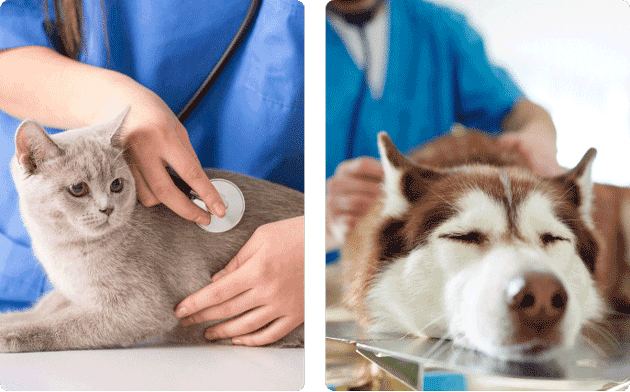
Like any member of your family, an unexpected illness or injury can happen to your pet at any time and with that comes unforeseen expenses.
To help with these unexpected costs Sydney Animal Hospitals offer a number of payment options such as Afterpay, Zip, VetPay, cash and credit card.
If you have pet insurance you may be able to claim on the spot and only pay the gap with GapOnly™
SYDNEY ANIMAL HOSPITALS ACCEPT

Frequently Asked Questions
Common questions pet owners ask regarding cat vaccinations
What Vaccines Do Cats Need Yearly?
There are a group your cat will need each 12 months for the best chance to prevent illness. So, what shots do cats need? These are:
- Vaccine FVRCP
- Feline distemper
- FeLV
- Rabies
If you’re wondering if your pet is up to date with these shots, contact your vet to check on their history.
Are Vaccinations Safe for My Cat?
Core shots recommended include rabies and feline viral rhinotracheitis (FVR), calicivirus (FCV), and panleukopenia (FVP) vaccines. Non-core vaccinations, such as feline leukemia virus (FeLV) and feline immunodeficiency virus (FIV), may be recommended based on your pet’s lifestyle and risk factors.
Vaccination schedules vary, but most core vaccines require initial doses followed by booster shots every 1-3 years.
Do Indoor Cats Need Vaccinations?
Yes, even indoor cats need shots. They can still be exposed to diseases through contact with other animals, accidental escape, or contact with humans who may inadvertently carry infectious agents. At a minimum, core vaccinations are recommended for all felines to ensure they’re protected against common contagious diseases.
What Happens if My Cat Misses a Vaccination?
If your cat misses a scheduled vaccination, contacting your veterinarian is important to reschedule as soon as possible. Depending on the vaccine and the length of time since the last dose, your veterinarian may recommend restarting the vaccination series or simply administering a booster shot.
Regular vaccination is essential to maintain your pet’s immunity and protect against infectious diseases.
Latest Articles
From your Sydney Animal Hospitals team





